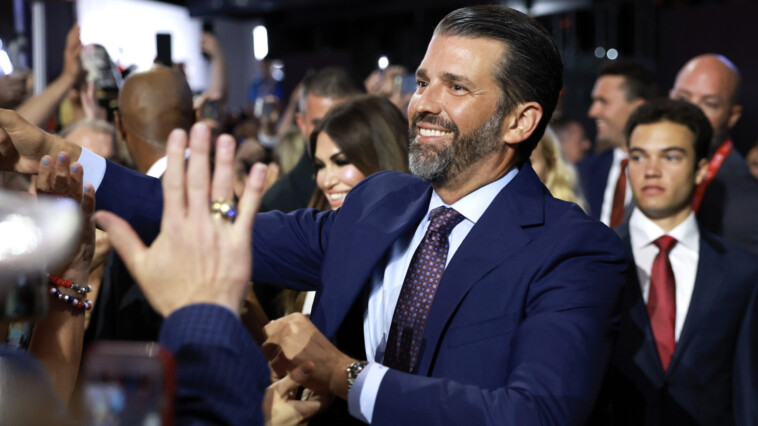Donald Trump Jr. called out a reporter on Friday for posting a misleading clip of Sen. JD Vance (R-OH) speaking a few years ago about immigration.
Reporter Jacqueline Sweet posted a clip on X from an interview that Vance, who is Donald Trump’s vice presidential running mate, gave in 2021 where he was asked about what negatives can come from large waves of immigration.
In the clip posted by Sweet, Vance talked about large waves of immigration from Europe to the U.S. over a hundred years ago, specifically Italian, German, and Irish immigrants.
“And that had had its problems, right?” Vance said. “It had its consequences. You had higher crime rates. You had these sort of ethnic enclaves developing. You had interethnic conflict in the country where you really hadn’t had that.”
However, the clip cut off Vance before he said that the U.S. adjusted to the problem by slowing immigration down for a while so that those communities could assimilate into the American fabric.
Sweet locked her account and, according to various users on X, was blocking people who were calling her out.
“Hey hack – Why are you blocking people for calling you out over dishonestly editing this clip?” Trump Jr. posted on X.
Tickets for “Am I Racist?” are on sale NOW! Buy here for a theater near you.
Yet another leftwing keyboard warrior taking @JDVance‘s words out of context.
In the rest of the clip (that she intentionally cut off), JD went on to say that were also upsides to the waves of immigration and that we slowed down immigration from these countries to give people… https://t.co/6yiBXFaDJk pic.twitter.com/oZSS1lAUO7
— Greg Price (@greg_price11) August 16, 2024
Trump Jr. highlighted a tweet that contained Vance’s full remarks on the subject.
“I think it’s one of these things that’s evolved over time, right?” Vance said. “So obviously you had this massive wave of Italian and primarily Italian, Irish, and German immigration, right? And that had its problems, right? It had its consequences. You had higher crime rates. You had these sort of ethnic enclaves developing. You had interethnic conflict in the country where you really hadn’t had that before.”
“And so there were downsides to it. Obviously, there were upsides, too,” Vance continued. “And one of the cool things that we did in the 1920s is we just sort of slowed down immigration a little bit, we let those, those sort of populations who had come to the country as new citizens, really incorporate themselves into the broader American fabric.”



